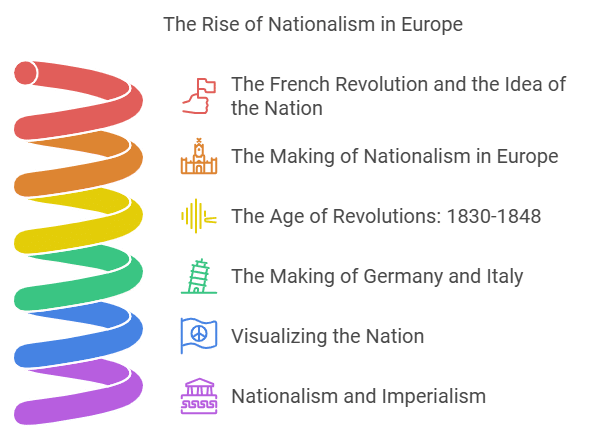4 Days Timetable: The Rise of Nationalism in Europe | Social Studies (SST) Class 10 PDF Download
The chapter we are about to delve into, "The Rise of Nationalism in Europe," is a crucial part of the Class 10 Social Science curriculum, specifically from the book "India and the Contemporary World." Understanding the content of this chapter is vital not only for your academic knowledge but also for performing well in the Class 10 board exams. This chapter encompasses various topics that help you comprehend the historical context of nationalism in Europe, which significantly shaped the modern world. To excel in the board exam, it's essential to have a clear grasp of the following topics within this chapter:
Topics to Cover
Before we begin our study plan, let's outline the topics we need to cover in this chapter:

Now, let's break down our study plan for this chapter:
Day 1: The French Revolution and the Idea of the Nation
What to Cover:
- The impact of the French Revolution on the idea of the nation.
- How the French Revolution led to the rise of nationalism in France and Europe.
Study Tips:
- Start by reading the chapter in your NCERT textbook.
- Refer to EduRev's Chapter: The Rise of Nationalism in Europe for a concise overview.
- After reading, reinforce your understanding with EduRev's Short Answer Questions.
Day 2: The Making of Nationalism in Europe & The Age of Revolutions: 1830-1848
What to Cover:
- The process of nationalism evolving in Europe.
- The revolutionary events of 1830-1848 and their impact on nationalism.
Study Tips:
- Dive into your NCERT textbook and EduRev's Chapter Notes.
- Use EduRev's Mindmap to visualize key concepts.
- Enhance your knowledge with EduRev's Unit Test.
Day 3: The Making of Germany and Italy & Visualising the Nation
What to Cover:
- The unification of Germany and Italy and their role in the development of nationalism.
- How visual symbols and ideas contributed to the concept of the nation.
Study Tips:
- Revisit the corresponding sections in your NCERT textbook.
- Utilize EduRev's PPT for a visual aid.
- Test your knowledge with EduRev's Assertion & Reason type questions test.
Day 4: Nationalism and Imperialism
What to Cover:
- How nationalism interacted with imperialism and colonialism.
- The broader implications of nationalism in Europe and the world.
Study Tips:
- Go through the final section of the chapter in your NCERT textbook.
- Review key concepts with EduRev's Key Concepts.
- Challenge yourself with EduRev's Practice Questions.
Day 5: Revision
On this day, focus solely on revising the topics you've covered over the past four days. Use the following resources for effective revision:
- EduRev's Topic Wise tests for each topic.
- EduRev's Case Based Questions to reinforce your understanding.
- Solve past year questions available in EduRev's Past Year Questions.
By diligently following this study plan and revising effectively, you'll be well-prepared for your Class 10 board exam. Remember, practice is key, so don't shy away from solving various types of questions to solidify your knowledge.
For a comprehensive approach to your Class 10 studies, including other subjects, explore the Class 10 Boards section on EduRev. Good luck with your exams!
Here are all the important links and topic-specific links for the chapter "The Rise of Nationalism in Europe" at the end for easy reference:
Important Links:
- Class 10 Boards: Explore Class 10 board exam resources on EduRev.
- Past Year Questions: Access past year board exam questions.
- Chapter Link: Find video lectures, documents, and MCQs related to this chapter.
- Chapter Notes: Get comprehensive chapter notes.
- NCERT Textbook: Access the NCERT textbook for this chapter.
- NCERT Solutions: Find solutions to NCERT textbook questions.
- Short Answer Questions: Practice short answer questions.
- Topic Wise Tests: Take topic-wise tests to assess your knowledge.
- Unit Test: Attempt unit tests to gauge your understanding.
- Mindmap: Use mindmaps for visual learning.
- Crash Course Social Science Class 10: Access a crash course for a quick recap.
- Assertion & Reason type questions test: Practice assertion and reason-based questions.
- Assertion & Reason based questions: Review assertion and reason-based questions.
- Practice Questions: Practice additional questions for the chapter.
- Flowcharts & Important terms: Utilize flowcharts and important terms.
- Case Based Questions: Practice case-based questions.
- PPT: Review PowerPoint presentations for visual aids.
- Worksheet with Solutions: Complete worksheets with solutions.
- Key Concepts: Review key concepts related to the chapter.
These resources will be invaluable in your preparation for the Class 10 board exam's "The Rise of Nationalism in Europe" chapter.
Good luck with your studies!
|
94 videos|630 docs|79 tests
|
FAQs on 4 Days Timetable: The Rise of Nationalism in Europe - Social Studies (SST) Class 10
| 1. What were the key causes of the French Revolution? |  |
| 2. How did nationalism develop in Europe during the 19th century? |  |
| 3. What role did visual arts play in the promotion of nationalism? |  |
| 4. How did nationalism contribute to imperialism in the late 19th century? |  |
| 5. What were the major outcomes of the revolutions of 1848 in Europe? |  |






















